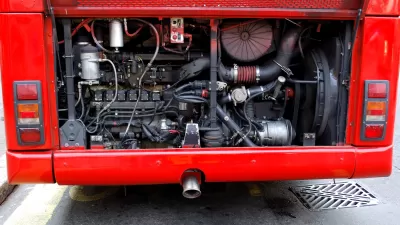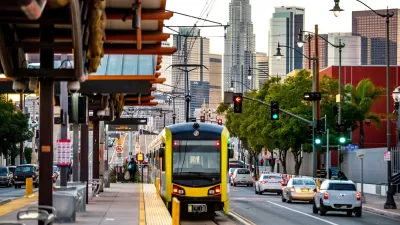In a recent blog post (at http://www.planetizen.com/node/44518) Steven Polzin argues that drivers are more productive because they get places faster. His post, in turn, generated an avalanche of critiques noting the negative externalities of auto travel (e.g. pollution, death and injury from traffic accidents, health costs of obesity, etc.). But what I'd like to address is something else: the positive productivity benefits of transit use. Let's suppose that it takes me 30 minutes to reach destination X on the bus, and 15 minutes by car. Obviously, the car is more productive. Right?
In a recent blog post (at http://www.planetizen.com/node/44518) Steven Polzin argues that drivers are more productive because they get places faster. His post, in turn, generated an avalanche of critiques noting the negative externalities of auto travel (e.g. pollution, death and injury from traffic accidents, health costs of obesity, etc.).
But what I'd like to address is something else: the positive productivity benefits of transit use. Let's suppose that it takes me 30 minutes to reach destination X on the bus, and 15 minutes by car. Obviously, the car is more productive. Right?
Not necessarily. On the bus, I can read and write. In my job, reading and writing are fairly major parts of my work, so being able to read is really, really important.*
In addition, I can safely make cell phone calls and text messages on the bus; such activity, although common for drivers, is nevertheless unwise. If you are tempted to use a car as a phone booth or restaurant, please google "distracted driving"; you will learn that such behavior is controversial to say the least.
And if I have to walk to a transit stop, this is actually productive time as well, insofar as it brings exercise into my day.
Admittedly, not all transit trips are equally productive: on an overcrowded transit vehicle, I may have to stand, thus making it more difficult for me to engage in any of the rewarding activities discussed above. In my experience, there has been a tradeoff between the overall quality of the transit system and the ability to get a seat of my own. In cities with mediocre transit systems, I spend more time waiting for buses and getting to my destination (bad) but have no difficulty getting a seat (good); an inadequate transit system, by scaring off customers, may actually make transit service more physically comfortable in this respect. In downtown Toronto or midtown Manhattan, travel time is more likely to be competitive with driving (good) but I might have to stand up (bad).
*Granted, you can listen to "books on tape" in a car, but audiobooks are not an adequate substitute for real books for two reasons. First, only the most popular books are on tape; for example, a brief look at amazon.com reviewed no audiobook versions of anything by Andres Duany, Sam Staley or Jane Jacobs- to name three of the more popular writers on planning issues. Second, the
necessity of paying attention to other drivers limits my ability to get very
much out of the book.

Planetizen Federal Action Tracker
A weekly monitor of how Trump’s orders and actions are impacting planners and planning in America.

Maui's Vacation Rental Debate Turns Ugly
Verbal attacks, misinformation campaigns and fistfights plague a high-stakes debate to convert thousands of vacation rentals into long-term housing.

San Francisco Suspends Traffic Calming Amidst Record Deaths
Citing “a challenging fiscal landscape,” the city will cease the program on the heels of 42 traffic deaths, including 24 pedestrians.

Defunct Pittsburgh Power Plant to Become Residential Tower
A decommissioned steam heat plant will be redeveloped into almost 100 affordable housing units.

Trump Prompts Restructuring of Transportation Research Board in “Unprecedented Overreach”
The TRB has eliminated more than half of its committees including those focused on climate, equity, and cities.

Amtrak Rolls Out New Orleans to Alabama “Mardi Gras” Train
The new service will operate morning and evening departures between Mobile and New Orleans.
Urban Design for Planners 1: Software Tools
This six-course series explores essential urban design concepts using open source software and equips planners with the tools they need to participate fully in the urban design process.
Planning for Universal Design
Learn the tools for implementing Universal Design in planning regulations.
Heyer Gruel & Associates PA
JM Goldson LLC
Custer County Colorado
City of Camden Redevelopment Agency
City of Astoria
Transportation Research & Education Center (TREC) at Portland State University
Jefferson Parish Government
Camden Redevelopment Agency
City of Claremont






























